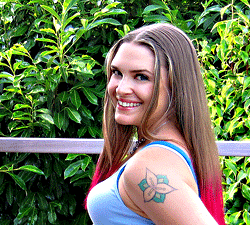BEFORE MYSPACE and blogging, there were handwritten teen diaries, adorned with sparkles and unicorns, then updated with anarchist symbols and goth iconography, through those difficult high-school years. (“Mrs. Trent Reznor, Mrs. Trent Reznor, Mrs. Trent Reznor, Mrs. Trent….”) Some were thrown away in disgust when the Smiths disbanded; others were tucked discreetly into cardboard boxes now gathering dust in the attic above the suburban homes where former tattooed riot grrrls are now happily raising families and attending church.
Ariel Meadow Stallings, a Seattle editor and writer (Offbeat Bride, Seal Press, $15.95), wants those adolescent diaries, letters, poems, and mash notes. The more embarrassing, immature, and emotionally out-of-date, the better. Because they supply the texts for her Salon of Shame, founded in late 2005, and now appearing at Bumbershoot for the very first time. She doesn’t make fun of those youthful journals, however; that job belongs to you, the writer-performer, in her bimonthly staged reading series.
“Ordinarily, we’re a late-night show in a bar,” says Stallings, a vivacious young woman of about 30, energetically twirling her pigtails as we sit down to chat. She’s the first to admit the influence of other, prior confessional reading series in New York (Cringe) and L.A. (Mortified). “Clearly, it’s in the zeitgeist right now, the fact that these are springing up all over the country. When people say, ‘What a great idea!’ I say, ‘Yeah, but it’s not mine.'”
But she pioneered the idea in Seattle—first at the Jewel Box Theater (in Belltown’s Rendezvous bar). The SRO success was such that she doubled her venue size (to about 125), moving to the basement of the Capitol Hill Arts Center earlier this year. She regularly mines her own adolescent journals as an onstage reader, but says, “I’m not the emcee. I’m the producer. I have Jeannie Yandel [of KUOW] who emcees. For the last year or so…we’ve just been chronically sold out.”
What’s the audience demo that makes the event so popular? “Mostly women, and most of the readers are frequently women. I would say it’s about three-fourths women readers, which is a sad commentary on how few high-school boys keep diaries. We get more poetry from men.”
And where do the performers come from? “I don’t audition people before they read,” says Stallings. “I have a stable of regular readers, whom I will contact directly. But I’ll also put out a call to the [e-mail] notification list and say, ‘OK, here’s your chance.’ And readers get in for free. There’s a little bit of an open-mike portion at the end.”
stallings admits that Bumbershoot will be a different kettle of awkward crushes, first kisses, and mornings confronting horrible acne in the mirror before the school bus arrives. To begin with, this will be an abbreviated greatest-hits program of prior readers. Notables, besides Stallings herself, include Brangien Davis of Swivel magazine, KUOW’s Phyllis Fletcher, and local poet Marc Mazique. (The latter complained to her about reprising old material, “But I’ve got all sorts of terrible writing.”)
And though catharsis is the goal, there will be no booze to loosen those tongues under the harsh noonday sun.
But even at a dry event, says Stallings, “Most people view it as being hugely therapeutic. Some of these [old diaries] literally have a lock on them! And then you read this intimate writing in front of an audience, and everyone’s laughing and shouting things back like, ‘Oh, I’ve been there!’ And then you realize that these intimacies, these secrets that we held so close in our adolescence, were completely universal. We have people between their early 20s and their 50s reading. These mortifying thoughts are all the same.
“We have these few rules—you have to have written it, it needs to be short, you can only embarrass yourself; you can’t read someone else’s writing. Junior high and high school tend to work best.”
Yet distance is the key, Stallings observes: “If you read something from a year ago, you’re not laughing at some long-gone version of yourself. It’s a little uncomfortable. Even the college writing, there’s a little too much self-awareness. This is at its core a bittersweet comedy event. It’s literary comedy-ish. The funniest readings are the ones that are over the top in their angst or passion or anger or self-loathing. The lack of perspective is part of the joy of the readings.”
Which is why the 75-minute program of stage-proven embarrassments should be about right, she concludes. “You can only take so much shameful diary reading in one seating, and then it just gets painful.”








